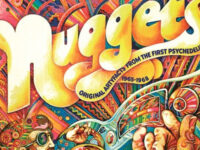The early-1970s witnessed the rise of progressive rock. Defined by super fancy musicianship comprised of complex and elaborate arrangements, the genre knew no bounds. Born from the ashes of psychedelic music, progressive rock was further personified by its melting pot of styles, as well as its loopy lyrical content, ranging anywhere from naval-gazing meditations to the adventures of mythological creatures to science fiction themes to acid-induced visions.
Hailing from London, England, Uriah Heep proved to be one of the leading lights illuminating the progressive rock scene. Although the band’s first two albums, Very ‘Eavy, Very ‘Umble and Salisbury were buttered with cool concepts, their third effort, Look at Yourself (Mercury Records) sealed their fate as serious forces to be dealt with.
Exploding to and fro with dueling guitars, steel-plated drumming and wild and waltzing keyboard measures, the disc rocks, rips, rushes and roars with interesting and amazing instrumentation in spades. Can’t forget to mention those shifting rhythms, enthralling melodies or clever time changes either. Aerobic vocals, veering from glass-shattering shrieks to manly grunts, complemented by the kind of fat and full-bodied harmonies the Sweet and Queen would later employ, also occupy the material.
Starting out on a mellow note, “July Morning” eventually balloons into a mesmerizing mass of dramatic emotions, intensified by the band’s powerful and intense playing. The title track of the album frolics fast and ferociously to a pumping beat and the positively petrifying “Shadows Of Grief” flies and flourishes to a spectacular showcase of raging riffing, haunting organ moves and a monumental presence all the way around.
Plumped with muscle and might, “Tears In My Eyes” and the head-banging bliss of the fired and wired “Love Machine” additionally make “Look At Yourself” the utterly incredible record it is. Screaming with ambition and shamelessly self-indulgent in certain spots, Look at Yourself keenly bridges the gap between psychedelic leftovers and future heavy metal sounds.
The front cover of the original release of the album came equipped with a mirror, which no doubt encouraged many a patron to use it for rolling joints or chopping cocaine. But hey, who needs drugs when you’ve got an album as good as Look at Yourself? Here’s a record that produces a natural high!
- Why Aerosmith Finally Broke Through With ‘Get Your Wings’ - March 5, 2024
- How ‘The Birds, the Bees and the Monkees’ Blew Away Their Pre-Fab Image - April 10, 2023
- Steve Howe Made a Colorful, Quite Surprising Debut With Tomorrow - February 20, 2023




